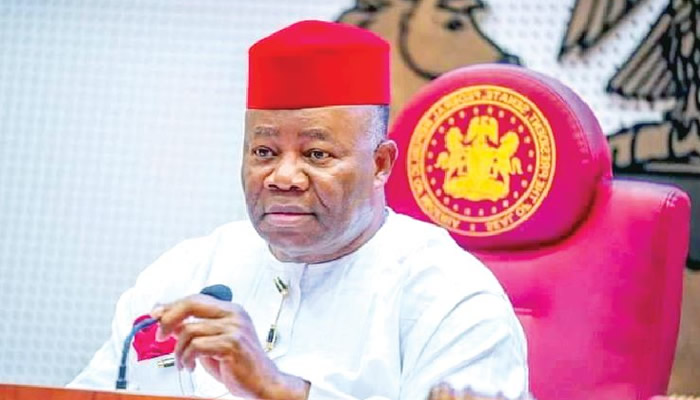In a recent plenary session, Senate President Godswill Akpabio commended Akwa Ibom State Governor Umo Eno for managing the local government elections, which took place on a Sunday and resulted in significant outcomes, particularly in the Essien Udim Local Government Area, Akpabio’s home turf. While the elections were largely dominated by the Peoples Democratic Party (PDP), which won 30 out of the 31 local government areas, there were notable controversies, specifically regarding the election in Essien Udim. The local elections not only highlighted party rivalries but also mirrored deeper issues concerning electoral integrity in the state. Audaciously, the All Progressives Congress (APC) candidate, Usoro Effiong, emerged victorious in a zone that traditionally leaned towards PDP.
Amidst the uproar, Akpabio openly supported the APC candidate’s victory, countering claims put forth by various political figures—including Michael Afangideh—that suggested the PDP candidate should have rightfully won in Essien Udim. Throughout his address, Akpabio asserted that the elections, albeit flawed, were a step forward. His acknowledgment of the imperfections showed a willingness to engage in a dialogue concerning electoral processes, consequently allowing for the legitimate outcome of the local elections in his own constituency. This move was reflective of Akpabio’s broader agenda to improve the state’s electoral processes and ensure fairness across the board.
In his appreciation of Governor Eno, Akpabio emphasized the need for a more robust and transparent electioneering system. “With people like Governor Eno, there is hope,” he stated, advocating for a national discourse focused on redefining and revisiting electoral mandates within local government systems. This statement not only underscored his faith in Eno’s leadership but also signified Akpabio’s commitment to advocating for political reforms that transcend party lines. He delineated local government elections as critical to the functioning of democracy, urging that they should be characterized by transparency and devoid of party dominance.
As the discussion evolved, Akpabio articulated the vital need to reposition local government as the third tier of governance, emphasizing its significance in the nation’s democratic framework. His firm stance suggested a recognition that local government elections play a crucial role beyond partisan affiliations and should focus primarily on community representation and accountability. In light of recent Supreme Court rulings that dictate local government funds be disbursed directly to the councils, he called on the National Assembly to ensure this directive was implemented seamlessly. This could empower the local governments to have better control over resources, fostering greater accountability and efficiency.
Reflecting on his tenure as governor from 2007 to 2015, Akpabio shared personal anecdotes from his experiences in conducting local government elections. His assertion that he successfully oversaw credible elections, even amidst opposition, demonstrated his understanding of the complexities involved in local governance. He recounted instances where, against the odds, he ensured rightful winners were declared, reinforcing the idea that committed leadership is essential to achieving fair electoral outcomes. His recollection served both as a testament to his administrative capabilities and as a critique of current practices, underscoring the need for integrity in the electoral process.
Senator Abba Moro and other senators echoed Akpabio’s sentiments, solidifying the collective acknowledgment of the need for reform in local government elections. The discussions during the plenary indicated a strong desire among the legislators to mute political biases and facilitate a more equitable electoral environment, reflecting a potential shift in Akwa Ibom’s political landscape. In conclusion, Akpabio’s remarks not only highlighted the significant challenges faced in the recent local elections but also illuminated the path towards reform, urging for dialogues that would foster democracy while uplifting the standards of governance in Akwa Ibom State and beyond.














